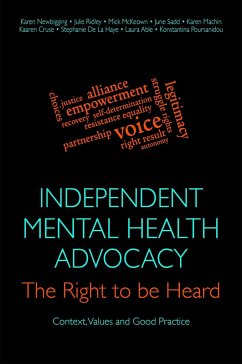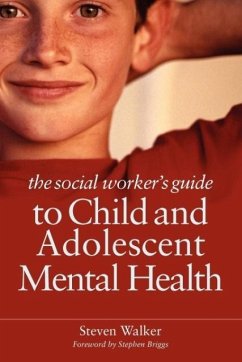Julie Ridley, Karen Newbigging, Mick McKeown, June Sadd, Karen Machin, Kaaren Cruse, Stephanie De La Haye, Laura Able, Konstantina Poursanidou
Independent Mental Health Advocacy - The Right to Be Heard
Context, Values and Good Practice
Julie Ridley, Karen Newbigging, Mick McKeown, June Sadd, Karen Machin, Kaaren Cruse, Stephanie De La Haye, Laura Able, Konstantina Poursanidou
Independent Mental Health Advocacy - The Right to Be Heard
Context, Values and Good Practice
- Broschiertes Buch
- Merkliste
- Auf die Merkliste
- Bewerten Bewerten
- Teilen
- Produkt teilen
- Produkterinnerung
- Produkterinnerung
The definitive guide to Independent Mental Health Advocacy (IMHA), covering the role that IMHAs play within mental health services, the principles and practice of the role, and the legal and political contexts.
Andere Kunden interessierten sich auch für
![Anti-Discriminatory Practice in Mental Health Care for Older People Anti-Discriminatory Practice in Mental Health Care for Older People]() Anti-Discriminatory Practice in Mental Health Care for Older People58,99 €
Anti-Discriminatory Practice in Mental Health Care for Older People58,99 €![Making Partnerships with Service Users and Advocacy Groups Work Making Partnerships with Service Users and Advocacy Groups Work]() Jackie MartinMaking Partnerships with Service Users and Advocacy Groups Work52,99 €
Jackie MartinMaking Partnerships with Service Users and Advocacy Groups Work52,99 €![An Integrated Approach to Family Work for Psychosis An Integrated Approach to Family Work for Psychosis]() Gina SmithAn Integrated Approach to Family Work for Psychosis52,99 €
Gina SmithAn Integrated Approach to Family Work for Psychosis52,99 €![Developing Advocacy for Children and Young People Developing Advocacy for Children and Young People]() Developing Advocacy for Children and Young People52,99 €
Developing Advocacy for Children and Young People52,99 €![The Social Worker's Guide to Child and Adolescent Mental Health The Social Worker's Guide to Child and Adolescent Mental Health]() Steven WalkerThe Social Worker's Guide to Child and Adolescent Mental Health48,99 €
Steven WalkerThe Social Worker's Guide to Child and Adolescent Mental Health48,99 €![Understanding the Mental Health Problems of Children and Adolescents Understanding the Mental Health Problems of Children and Adolescents]() Kirstin PainterUnderstanding the Mental Health Problems of Children and Adolescents58,99 €
Kirstin PainterUnderstanding the Mental Health Problems of Children and Adolescents58,99 €![International Reflections on Approaches to Mental Health Social Work International Reflections on Approaches to Mental Health Social Work]() International Reflections on Approaches to Mental Health Social Work74,99 €
International Reflections on Approaches to Mental Health Social Work74,99 €-
-
-
The definitive guide to Independent Mental Health Advocacy (IMHA), covering the role that IMHAs play within mental health services, the principles and practice of the role, and the legal and political contexts.
Hinweis: Dieser Artikel kann nur an eine deutsche Lieferadresse ausgeliefert werden.
Hinweis: Dieser Artikel kann nur an eine deutsche Lieferadresse ausgeliefert werden.
Produktdetails
- Produktdetails
- Verlag: Jessica Kingsley Publishers
- Seitenzahl: 336
- Erscheinungstermin: 21. Juli 2015
- Englisch
- Abmessung: 226mm x 150mm x 17mm
- Gewicht: 458g
- ISBN-13: 9781849055154
- ISBN-10: 1849055157
- Artikelnr.: 42397883
- Herstellerkennzeichnung
- Libri GmbH
- Europaallee 1
- 36244 Bad Hersfeld
- gpsr@libri.de
- Verlag: Jessica Kingsley Publishers
- Seitenzahl: 336
- Erscheinungstermin: 21. Juli 2015
- Englisch
- Abmessung: 226mm x 150mm x 17mm
- Gewicht: 458g
- ISBN-13: 9781849055154
- ISBN-10: 1849055157
- Artikelnr.: 42397883
- Herstellerkennzeichnung
- Libri GmbH
- Europaallee 1
- 36244 Bad Hersfeld
- gpsr@libri.de
Karen Newbigging is a Senior Lecturer at the Health Services Management Centre, University of Birmingham and is active in advocacy research and development. Julie Ridley is a Reader in Applied Social Sciences in the School of Social Work, University of Central Lancashire. Mick McKeown is a Reader in Democratic Mental Health in the School of Health, University of Central Lancashire. June Sadd, an independent survivor consultant, educator and researcher, draws on her personal experience of the psychiatric system in her work. Karen Machin works freelance in mental health from a perspective of lived experience. Kaaren Cruse is an independent user consultant and researcher. Stephanie De La Haye is an independent user consultant, educator and researcher in mental health. Laura Able is a peer researcher with an interest in disability studies. Konstantina Poursanidou is a Post-doctoral Research Fellow at the Service User Research Enterprise (SURE), Institute of Psychiatry, Psychology and Neuroscience, King's College London.
Acknowledgements. Foreword. Kris Chastey. Preface. Tony Brandon. 1.
Introduction. From Powerlessness to Power. Part 1. Setting the Scene. 2.
Understanding the Territory. Laura Able and Konstantina Poursanidou,
Service User Research Enterprise, Health Service and Population Research
Department, Institute of Psychiatry, Psychology and Neuroscience, King's
College London. 3. 'An intelligent and active sympathy' - a brief
historical overview. Karen Machin. 4. Mental Health Advocacy, rights and
the law. Stephanie De La Haye, User Mental Health Consultant and
Researcher. 5. "My rights TO my voice": Service user experiences of
compulsion. Laura Able and Karen Machen. 6. Research and reviews of mental
health advocacy. Stephanie De La Haye. Part 2. The Practice and Experience
of IMHA Services. 7. IMHA role and services. 8. Making a Difference:
Outcomes from independent mental health advocacy. Kaaren Cruse. 9. Doing
advocacy well: values, knowledge and skills. Karen Cruse and June Sadd. 10.
One size fits all? Meeting diverse needs. June Sadd. 11. Relationships with
service providers. 12. Commissioning effective IMHA services. 13.
Conclusions - The future for advocacy: a glass half full? References.
Glossary. Useful Resources.
Introduction. From Powerlessness to Power. Part 1. Setting the Scene. 2.
Understanding the Territory. Laura Able and Konstantina Poursanidou,
Service User Research Enterprise, Health Service and Population Research
Department, Institute of Psychiatry, Psychology and Neuroscience, King's
College London. 3. 'An intelligent and active sympathy' - a brief
historical overview. Karen Machin. 4. Mental Health Advocacy, rights and
the law. Stephanie De La Haye, User Mental Health Consultant and
Researcher. 5. "My rights TO my voice": Service user experiences of
compulsion. Laura Able and Karen Machen. 6. Research and reviews of mental
health advocacy. Stephanie De La Haye. Part 2. The Practice and Experience
of IMHA Services. 7. IMHA role and services. 8. Making a Difference:
Outcomes from independent mental health advocacy. Kaaren Cruse. 9. Doing
advocacy well: values, knowledge and skills. Karen Cruse and June Sadd. 10.
One size fits all? Meeting diverse needs. June Sadd. 11. Relationships with
service providers. 12. Commissioning effective IMHA services. 13.
Conclusions - The future for advocacy: a glass half full? References.
Glossary. Useful Resources.
Acknowledgements. Foreword. Kris Chastey. Preface. Tony Brandon. 1.
Introduction. From Powerlessness to Power. Part 1. Setting the Scene. 2.
Understanding the Territory. Laura Able and Konstantina Poursanidou,
Service User Research Enterprise, Health Service and Population Research
Department, Institute of Psychiatry, Psychology and Neuroscience, King's
College London. 3. 'An intelligent and active sympathy' - a brief
historical overview. Karen Machin. 4. Mental Health Advocacy, rights and
the law. Stephanie De La Haye, User Mental Health Consultant and
Researcher. 5. "My rights TO my voice": Service user experiences of
compulsion. Laura Able and Karen Machen. 6. Research and reviews of mental
health advocacy. Stephanie De La Haye. Part 2. The Practice and Experience
of IMHA Services. 7. IMHA role and services. 8. Making a Difference:
Outcomes from independent mental health advocacy. Kaaren Cruse. 9. Doing
advocacy well: values, knowledge and skills. Karen Cruse and June Sadd. 10.
One size fits all? Meeting diverse needs. June Sadd. 11. Relationships with
service providers. 12. Commissioning effective IMHA services. 13.
Conclusions - The future for advocacy: a glass half full? References.
Glossary. Useful Resources.
Introduction. From Powerlessness to Power. Part 1. Setting the Scene. 2.
Understanding the Territory. Laura Able and Konstantina Poursanidou,
Service User Research Enterprise, Health Service and Population Research
Department, Institute of Psychiatry, Psychology and Neuroscience, King's
College London. 3. 'An intelligent and active sympathy' - a brief
historical overview. Karen Machin. 4. Mental Health Advocacy, rights and
the law. Stephanie De La Haye, User Mental Health Consultant and
Researcher. 5. "My rights TO my voice": Service user experiences of
compulsion. Laura Able and Karen Machen. 6. Research and reviews of mental
health advocacy. Stephanie De La Haye. Part 2. The Practice and Experience
of IMHA Services. 7. IMHA role and services. 8. Making a Difference:
Outcomes from independent mental health advocacy. Kaaren Cruse. 9. Doing
advocacy well: values, knowledge and skills. Karen Cruse and June Sadd. 10.
One size fits all? Meeting diverse needs. June Sadd. 11. Relationships with
service providers. 12. Commissioning effective IMHA services. 13.
Conclusions - The future for advocacy: a glass half full? References.
Glossary. Useful Resources.








